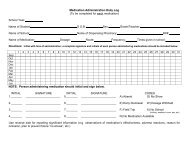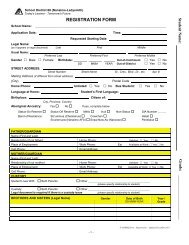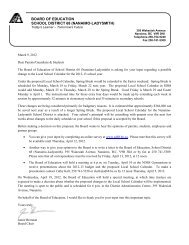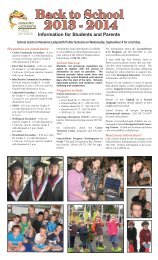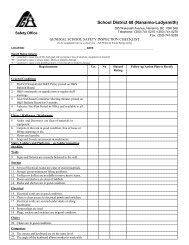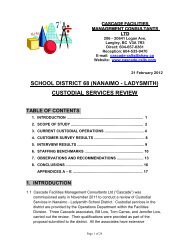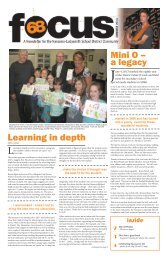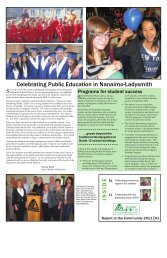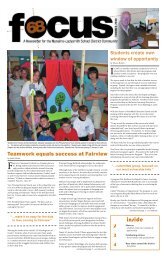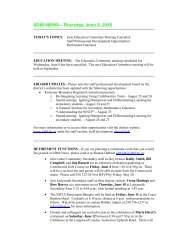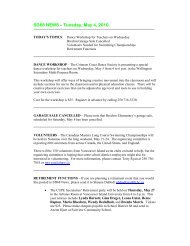Jump Rope and Hoops for Heart - School District 68
Jump Rope and Hoops for Heart - School District 68
Jump Rope and Hoops for Heart - School District 68
- No tags were found...
Create successful ePaper yourself
Turn your PDF publications into a flip-book with our unique Google optimized e-Paper software.
The Value of HomeworkBy Peter Skipper, Upl<strong>and</strong>s Park Elementary PrincipalHomework at first appears to be a simpletopic but it is not. It can be controversial<strong>and</strong> even in academic circles its value is debated,particularly at the elementary level.It is not my purpose in this article to describe the debate butto indicate that there is a diversity of attitudes about thevalue of homework. Some of those attitudes are culturallybased, some are socio-economically influenced, <strong>and</strong> some relateto parenting style.Traditionally, homework was given <strong>for</strong> simple tasks likememorization <strong>and</strong> practice to discipline the mind.What does research say about homework? Studying thetopic of homework is difficult because most researchers are notin homes observing homework as it is being carried out. Moststudies are based upon student <strong>and</strong> family surveys. Like learning,homework is a very individual enterprise.Studies that compared students who did homework to studentswho did not showed that generally students doing homeworkscored better on tests. Other studies compared the timespent on homework to achievement <strong>and</strong> positive results weregenerally found up to a cut-off point, a point of diminishing returnswhen the mind could no longer benefit from further study.However, in the earlier grade levels, there was no evidenceof improved academic per<strong>for</strong>mance based on homework. Forstudents in Grades 6-9 studies show a slight improvement inachievement based upon homework of less than one hour. Forhigh school students in Grades 10-12 research indicates there arebenefits in achievement with up to two <strong>and</strong> a half hours of homeworkper night. After this achievement declines or remains flat.It is evident that research does indicate that as students maturemore time spent on homework does result in higher gradesbut this is not the case <strong>for</strong> younger students.There is an in<strong>for</strong>mal homeroom rule that roughly coincideswith research about the appropriate amount of homework toprovide <strong>for</strong> different grade levels. Long endorsed by most teachers<strong>and</strong> educational associations is the “10 minute rule.” Thisrule states that the maximum of nightly homework should notexceed ten minutes per grade level. So a sixth grader should nothave more than 60 minutes of homework per night <strong>and</strong> a 1stgrader no more than 10 minutes.Compounding the homework debate is the considerationthat, as in school work, different students have different workingspeeds <strong>and</strong> time <strong>and</strong> attention to task. More time spent onhomework could just indicate a slower working speed.Needless to say the learning that is accomplished is more importantthan the time it takes to learn it. A principle of learning is10 - ConnectED - Spring 2011Upl<strong>and</strong>s Park Elementary Principal Peter Skipper with Upl<strong>and</strong>s Parkstudents from Grades 4 to 7that individuals learn at different rates. Some students may need tospend more time in study than others to learn concepts <strong>and</strong> skills.The quality of homework of course plays a role in underst<strong>and</strong>ing<strong>and</strong> developing skills <strong>and</strong> knowledge. The long termgoals are to develop self-discipline, improve academic skills <strong>and</strong>to increase learner confidence.Homework typically supports learningin one of the following ways:• Pre-learning to provide an introduction or provide backgroundto a topic coming up <strong>for</strong> discussion.• To check <strong>for</strong> underst<strong>and</strong>ing <strong>for</strong> the student to explain whatis happening <strong>and</strong> why.• The practice of rote skills such as multiplication tables <strong>and</strong>spelling words. However, such practice should only takeplace after teachers have checked <strong>for</strong> underst<strong>and</strong>ing as studentscan practice something incorrectly <strong>and</strong> internalizemisconceptions which are hard to get rid of.• Processing <strong>for</strong> students to reflect or think about what waslearned, come up with new questions to ask, apply skills <strong>and</strong>knowledge into new situations <strong>and</strong> otherwise show theycomprehend or see the ‘big picture’.Another reason is to extend learning time <strong>for</strong> students unableto complete work during school time (they should underst<strong>and</strong>what it is they are to do).Homework should have an academic purpose, help developstudent competence, assist in developing ownership of theirlearning <strong>and</strong> be generally interesting.If you have any questions about homework practices in yourchild’s class, talk to your child’s teacher. Your child’s teacherknows your child’s learning style, <strong>and</strong> will be able to outline <strong>for</strong>you the rationale <strong>for</strong> <strong>and</strong> benefits of the homework that is assignedin the classroom. &Source: Rethinking Homework by Cathy Vatterott (2009)



